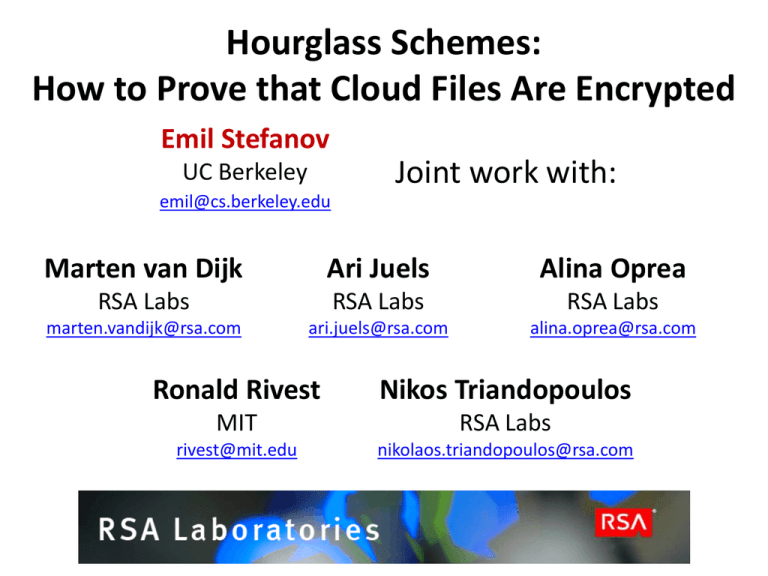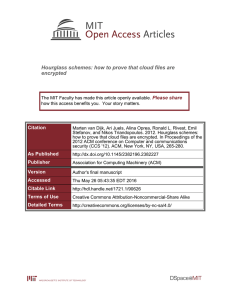Slides - Ari Juels
advertisement

Hourglass Schemes: How to Prove that Cloud Files Are Encrypted Emil Stefanov Joint work with: UC Berkeley emil@cs.berkeley.edu Marten van Dijk Ari Juels Alina Oprea RSA Labs RSA Labs RSA Labs marten.vandijk@rsa.com ari.juels@rsa.com alina.oprea@rsa.com Ronald Rivest Nikos Triandopoulos MIT RSA Labs rivest@mit.edu nikolaos.triandopoulos@rsa.com Public Cloud Computing Enterprise Enterprise • Pool of shared resources • Available on demand • Highly scalable User User User A Major Drawback • Large attack surface – Thousands of computers – Dozens of storage systems and interfaces • Amazon alone: S3, EBS, Instance Storage, Glacier, Storage Gateway, CloudFront, RDS, DynamoDB, ElastiCache, CloudSearch, SQS – Shared resources among thousands of tenants • Many possibilities for accidental data leakage. Defending Against Accidental Data Leakage ??? leakage • Simple view: – Just encrypt your data in the cloud. – Problem solved? Defending Against Accidental Data Leakage ??? leakage • More realistic view: – Often want to use the cloud for more than just raw storage. – Why? Want to outsource storage AND computation (services). – In that case, the cloud needs access to your decrypted data. Encrypt at Rest & Decrypt on the Fly ??? leakage Services Front End Storage Back End • Split the cloud into computation front-end and storage back-end – Already the case in many clouds (e.g., Amazon, Azure) • Storage backend only sees encrypted data. • Computation front-end decrypts data on the fly – Only accesses the data it really needs at any one time • Can be combined with tight access control and logging. – Key servers Encrypt at Rest & Decrypt on the Fly ??? leakage Services Front End Storage Back End complies with government regulations • Protects against data leakage by the storage back-end infrastructure. • Limits the amount of data leakage by the front-end at any one time. • Common practice. • Much better than no encryption. The Problem How can we be reasonably sure that the cloud is encrypting data at rest? Plaintext is simpler for the cloud to manage. • Lack of visibility – Users only see results (e.g., web pages) from the front-end. What is happening internally? • Download data and check encryption? – The cloud can always just encrypt on the fly. • Seems impossible! Our Solution Economically motivate the cloud to encrypt data at rest. • Impose financial penalties on misbehaving cloud providers. • We ensure that an economically rational cloud provider, encrypts data at rest. • Misbehaving cloud must use double storage. – Must store both decrypted and encrypted file. Our Solution: Hourglass Schemes encryption Original File client uploads file • The client never needs to permanently store and manage keys. hourglass Encapsulated File Encrypted File client verifies encryption client assists client verifies by periodically challenging random file blocks Intuition encryption Original File hourglass Encrypted File Hourglass property: adversarial cloud costly to compute “on the fly” wants to only store So an adversarial cloud must store both files. Double the storage! Encapsulated File client checks Hourglass Framework: More than a Scheme Modular Components • Encodings: – Encryption – Watermarking – File Bindings • Hourglass functions: – Butterfly – Permutation – RSA Encodings • Encryption: 𝑮 = 𝑬 𝑭 • Watermarking: 𝑮 = 𝑭||Tag – Embed a tag into the file – Tag says that the file is stored on a specific cloud – Tag signed by the cloud – Evidence of data leakage origin. • File Binding: 𝑮 = 𝑭𝟏 | 𝑭𝟐 | … ||𝑭𝒎 – Combine multiple files into one encoding. – E.g., embedded license. Hourglass Functions • Costly to apply “on the fly” • Impose a resource lower bound on the cloud to compute: 𝑮 → 𝑯, and hence 𝑭 → 𝑯 encoding (e.g., encryption) Original File 𝑯 𝑮 𝑭 hourglass Encrypted File Encapsulated File Hourglass Function: RSA 𝑭: 𝑭𝟏 𝑭𝟐 𝑭𝟑 𝑭𝟒 … 𝑭𝒏 𝑮: 𝑮𝟏 𝑮𝟐 𝑮𝟑 𝑮𝟒 … 𝑮𝒏 𝑯: 𝑯𝟏 𝑯𝟐 𝑯𝟑 𝑯𝟒 … 𝑯𝒏 Apply encoding (encryption, watermarking, file binding) Client computes 𝑯𝒊 = RSA−Sign 𝑮𝒊 using random RSA private key. • Cloud can always recover the plaintext 𝐹: – 𝐺𝑖 = RSA−RecoverMessage 𝐻𝑖 (using client’s public RSA key) – 𝐹𝑖 = Decode 𝐺𝑖 • Resource bound: computation – Completely infeasible for cloud: 𝐹 → 𝐻 – It doesn’t have the RSA signing key to do 𝐺 → 𝐻 Hourglass Function: Permutation 𝑭: 𝑭𝟏 𝑭𝟐 𝑭𝟑 𝑭𝟒 … 𝑭𝒏 𝑮: 𝑮𝟏 𝑮𝟐 𝑮𝟑 𝑮𝟒 … 𝑮𝒏 𝑯: 𝑯𝟏 𝑯𝟐 𝑯𝟑 𝑯𝟒 … 𝑯𝒏 Apply encoding (encryption, watermarking, file binding) Randomly permute the blocks of 𝐺 to form 𝐻. No cryptographic operations. Operates on tiny blocks. • Client later challenges the cloud for sequential ranges of 𝐻. – Sequential range in 𝑯 Random blocks in 𝑭 • Resource bound: disk seeks – A misbehaving cloud (that only stores 𝐹) will need to do many random accesses to respond to a challenge. Hourglass Function: Butterfly w = a known key PRP over a pair of file blocks 𝑮𝟏 𝑮𝟐 𝑮𝟑 𝑮𝟒 𝑮𝟓 𝑮𝟔 𝑮𝟕 𝑮𝟖 𝑯𝟏 𝑯𝟐 𝑯𝟑 𝑯𝟒 𝑯𝟓 𝑯𝟔 𝑯𝟕 𝑯𝟖 Comparison of Hourglass Functions 𝑶 𝒏 RSA exponentiations 𝑶 𝒏 𝐥𝐨𝐠 𝒏 AES operations less practical 𝑶 𝒏 random memory accesses more practical RSA Butterfly less assumptions RSA assumptions Permutation more assumptions storage speed seek inefficiency in rotational drives Comparison of Hourglass Functions Ran on Amazon EC2 (using a quadruple-extra-large high-memory instance and EBS Storage). Challenge-Response Protocol 𝑯: • The client challenges the cloud for blocks of the … 𝑯𝟏 𝑯𝟐 𝑯𝟒 𝑯𝟒 𝑯𝒏 encapsulated file 𝐻. – At random unpredictable times – Few challenges, e.g., 𝑂 log 𝑛 • Cloud must respond quickly. • Doable by an external auditor. – Auditor doesn’t see the plaintext 𝐹. Limitations • Assume files are not accessed to often. – Great for archiving files. • File updates are costly. – RSA hourglass function allows for updates. – Other hourglass functions must be re-applied to the entire file. • Works mainly for large files. Conclusions • Able to motivate the cloud to encrypt files are rest. • Several techniques – Encryption, watermarking, file binding. – Different hourglass functions with performanceassumption tradeoffs. • Economic models sometimes prevail where traditional cryptographic techniques cannot.







